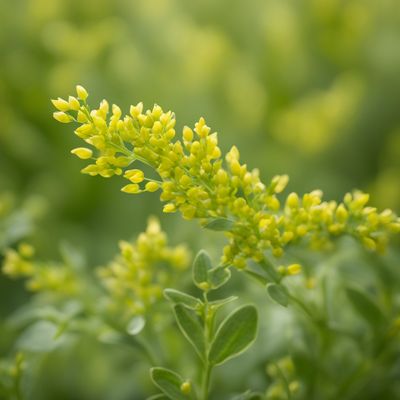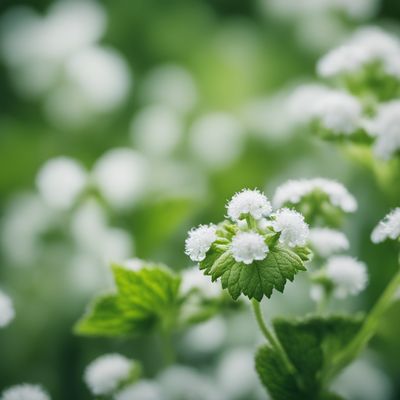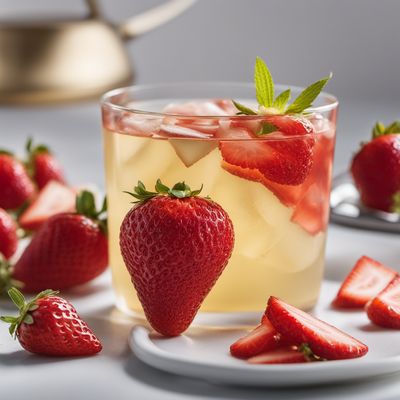
Ingredient
Ground ivy infusion leaves
"Nature's Herbal Elixir: Unveiling the Wonders of Ground Ivy Infusion Leaves"
Ground ivy infusion leaves are small, heart-shaped leaves that boast a vibrant green color and a delicate, yet distinct aroma. They have a slightly bitter taste with hints of mint and citrus, and their texture is smooth and velvety. These leaves are often used to infuse beverages, create herbal remedies, or add a unique flavor to various dishes.
Origins and history
Ground ivy is native to Europe and Asia, and it has been used for centuries in traditional medicine. It was believed to have healing properties and was used to treat various ailments, including respiratory issues, digestive problems, and skin conditions. In culinary history, ground ivy was used as a flavoring agent in beer brewing and as a substitute for hops.
Nutritional information
Ground ivy infusion leaves are a good source of vitamins A and C, as well as minerals like iron and potassium. They are low in calories and rich in antioxidants, making them a healthy addition to your diet.
Allergens
There are no known allergens associated with ground ivy infusion leaves.
How to select
When selecting ground ivy infusion leaves, look for fresh, vibrant leaves that are free from discoloration or wilting. Avoid leaves that have a yellowish hue or appear dried out. Opt for organic leaves whenever possible to ensure the absence of pesticides or chemicals.
Storage recommendations
To maintain the freshness of ground ivy infusion leaves, store them in a sealed plastic bag or airtight container in the refrigerator. They can stay fresh for up to a week when stored properly.
How to produce
Ground ivy infusion leaves can be easily grown in a garden or in pots. They thrive in moist, well-drained soil and prefer partial shade. Plant the seeds or seedlings in the desired location and provide regular watering and occasional pruning to maintain their growth.
Preparation tips
To prepare ground ivy infusion leaves, rinse them thoroughly under cold water to remove any dirt or debris. They can be used fresh or dried for various applications. Infuse the leaves in hot water to create a soothing herbal tea or incorporate them into salads, soups, or sauces for a unique flavor twist. Ground ivy infusion leaves can also be dried and ground into a powder to be used as a seasoning or herbal supplement.
Culinary uses
Ground ivy infusion leaves are commonly used to infuse teas, create herbal remedies, or add a refreshing flavor to salads, soups, and sauces. They can also be used as a garnish for desserts or cocktails.
Availability
Ground ivy infusion leaves are commonly available in Europe and Asia, where they are native. They can also be found in specialty herb stores or online.
More ingredients from this category » Browse all

Yellow sweet clover infusion leaves
Golden Elixir: Unveiling the Magic of Yellow Sweet Clover Infusion Leaves

Bearberry infusion leaves
The Healing Power of Bearberry

Smooth rupturewort infusion leaves
The Tranquil Herbal Elixir

White deadnettle infusion leaves
The Soothing Elixir: White Deadnettle Infusion Leaves

Strawberry infusion leaves
The Fragrant Essence of Strawberry

Sweet orange infusion leaves
Citrus Delight

Papaya infusion leaves
The Healing Power of Papaya Infusion Leaves

Eyebright infusion leaves
The Visionary Herb: Exploring the Benefits of Eyebright Infusion Leaves

Golden root infusion leaves
Exploring the Golden Elixir: Unveiling the Power of Golden Root Infusion

Hazelnut infusion leaves
Aromatic Hazelnut Elixir

Alfalfa infusion leaves
The Green Powerhouse: Alfalfa Infusion Leaves

Ironwort infusion leaves
The Herbal Elixir: Unveiling the Wonders of Ironwort Infusion Leaves